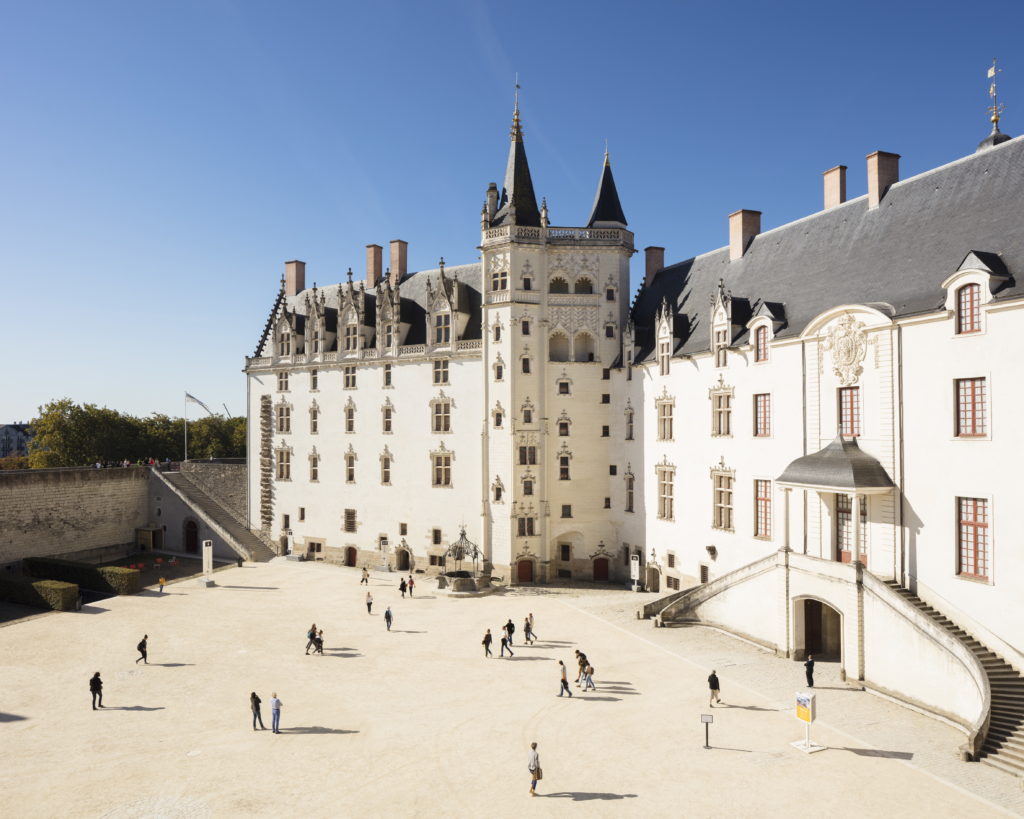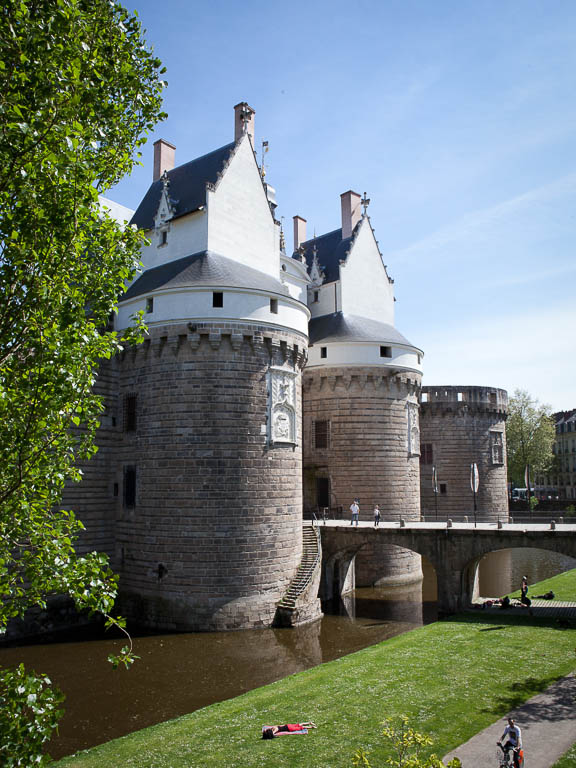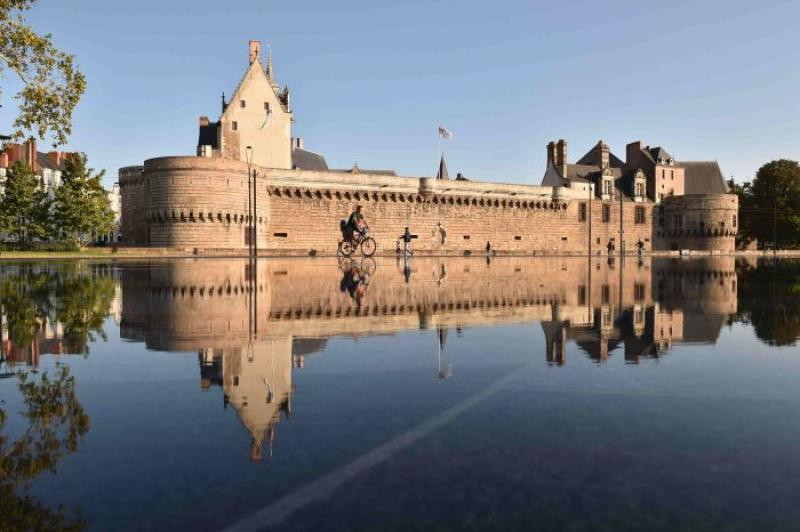
Chateau Des Ducs De Bretagne in Nantes, France Stock Photo Image of
Château des ducs de Bretagne (officiel), Nantes, France. 18,724 likes · 522 talking about this · 56,908 were here. Bienvenue sur la page officielle du. Bienvenue sur la page officielle du Château des ducs de Bretagne - musée d'histoire.

Le château des ducs de Bretagne à Nantes Môm'Art
La visite du château des ducs de Bretagne se fait entre 10 h et 18 h du mardi au dimanche. En effet, la bâtisse est fermée au public le lundi. En période estivale, du 1er juillet et jusqu'au 31 août, le château est ouvert tous les jours de la semaine, et ce, entre 10 h et 19 h. Tout comme la forteresse, le musée d'histoire de Nantes.

CHÂTEAU DES DUCS DE BRETAGNE COUR DU CHÂTEAU La Loire à Vélo
Plus qu'un château ordinaire, le château des ducs de Bretagne est un site animé, témoin de l'histoire passionnante de Nantes. Toute l'année, profitez des collections du musée d'histoire de Nantes, à la fois moderne et interactif. Dès l'arrivée des beaux jours, accordez-vous un moment de détente sur le jardin verdoyant des douves !

Chateau des Ducs de Bretagne, Nantes Book Tickets & Tours
Child-friendly interactive…. Opened in 1860, this exquisitely landscaped park is among France's most interesting botanical gardens. Century-old magnolia and mulberry trees, Japanese…. Edgy temporary art exhibitions, events and happenings fill this old industrial slipway, shaped like a wedge of cheese at the foot of Île de Nantes'….
France le château des Ducs de Bretagne de Nantes Les routes de tous
Le château des Ducs de Bretagne actuel a été construit au cours du XVe siècle à l'emplacement du premier château ducal qui fût, lui, construit sur une muraille gallo-romaine au XIIIe siècle. Il fut construit selon les instructions du dernier duc de la Bretagne indépendante, François II.Celui-ci souhaitait faire de ce château le lieu de résidence de la cour ducale mais aussi, et.

Château des Ducs de Bretagne Val de Loire
The Château des ducs de Bretagne is a large castle located in the city of Nantes in the Loire-Atlantique département of France; it served as the centre of the historical province of Brittany until its separation in 1956. It is located on the right bank of the Loire, which formerly fed its ditches. It was the residence of the Dukes of Brittany between the 13th and 16th centuries, subsequently.

France, LoireAtlantique, Nantes, the chateau des Ducs de Bretagne
Château des Ducs de Bretagne is Nantes' most important historical landmark and it certainly has the centuries of history to back it up. It has been listed as an historic monument since 1840, undergoing a huge restoration period of 15 years - during three of which it was closed to the public - reopening in a fresh and impressive state in 2007.

Nantes, Château des Ducs de Bretagne
Implanté dans le cœur historique de Nantes, le Château des ducs de Bretagne est le monument-phare de son patrimoine urbain, avec la Cathédrale Saint-Pierre. Côté ville, c'est une forteresse dont les 500 mètres de chemin de ronde sont ponctués de sept tours reliées par des courtines. Les douves et les remparts sont en accès libre.

Château des Ducs de Bretagne Monument Nantes
Set in the historic heart of Nantes, the Château des ducs de Bretagne is the city's most important historic building, along with the Cathedral St. Pierre. It was built in the late 15 th century by François II - the last Duke of Brittany - and later by his daughter, Anne of Brittany, who was twice Queen of France. This castle is filled.

Le Château des ducs de Bretagne à Nantes
Ouverture 7 jours/7, de 8h30 à 19h Du 1er juillet au 31 août : de 8h30 à 20h. Jardin des douves en accès libre Ouverture 7 jours/7, de 8h à 19h Du 1er juillet au 31 août : de 8h à 20h Fermetures annuelles du site 1er janvier, 1er mai, 1er novembre, 25 décembre. Accès. Château des ducs de Bretagne Musée d'histoire de Nantes 4 place.

Château des ducs de Bretagne. Nantes © Philippe Piron _ LVAN(2) Loire
Opening times. Courtyard and ramparts - freely accessible. Open 7 days a week: 8.30 am to 7 pm. 1 July > 31 August: 8.30 am to 8 pm. Château interiors, museum and exhibition. 10 am to 6 pm, closed Mondays. 1 July > 31 August: 10 am to 6 pm, 7 days a week.

CHÂTEAU DES DUCS DE BRETAGNE MUSÉE D'HISTOIRE DE NANTES La Loire à Vélo
Located in the historic heart of Nantes, the Château des Ducs de Bretagne is a landmark of the city's urban heritage. It was built at the end of the 15th century by François II, the last Duke of Brittany, and then by his daughter, Anne of Brittany, twice Queen of France. A château steeped in six centuries of history, it houses a residential.

Le château des Ducs de Bretagne
Take in all the highlights in just 2.5 hours, hopping off to stroll around the Japanese Garden, peek inside Saint Pierre Cathedral, and pose for photos in the beautiful Passage Pommeraye arcade. Along the way, see the Chateau des Ducs de Bretagne, Place Graslin, and the Machines de l'île, including the gigantic mechanical Elephant..

Bild "Château des Ducs de Bretagne Eingang" zu Schloss Nantes in Nantes
Le château des ducs de Bretagne est un château défensif et de plaisance situé à Nantes, dans le département de la Loire-Atlantique en France.Classé monument historique depuis 1840, il a principalement été construit au XV e siècle mais il comprend aussi des éléments datant du XIV e au XVIII e siècle.. Fondé par Guy de Thouars [1] au XIII e siècle pour constituer une base.

Mediaeval Castle of the Dukes of Brittany the Chateau Des Ducs De
Château des ducs de Bretagne - Musée d'histoire de Nantes. The Castle of the Dukes of Brittany, a listed historical monument, is a major tourist spot in Western France, welcoming more than 1.4 million visitors per year. On the city side, it's a fortress with a 1,650-foot (500-meter) parapet, punctuated by seven towers linked by curtain walls.

Nantes Et le monument le plus visité est...
The Castle. of Nantes. In the heart of Nantes' medieval quarter, come discover the Château des ducs de Bretagne: one of the city's most emblematic sights, built in the late-15th century by François II and his daughter, Anne of Brittany. Opening times. and acces.